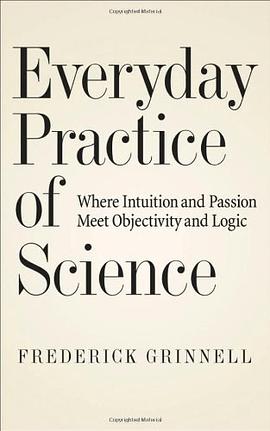

具体描述
Scientific facts can be so complicated that only specialists in a field fully appreciate the details, but the nature of everyday practice that gives rise to these facts should be understandable by everyone interested in science. This book describes how scientists bring their own interests and passions to their work, illustrates the dynamics between researchers and the research community, and emphasizes a contextual understanding of science in place of the linear model found in textbooks with its singular focus on "scientific method." Everyday Practice of Science also introduces readers to issues about science and society. Practice requires value judgments: What should be done? Who should do it? Who should pay for it? How much? Balancing scientific opportunities with societal needs depends on appreciating both the promises and the ambiguities of science. Understanding practice informs discussions about how to manage research integrity, conflict of interest, and the challenge of modern genetics to human research ethics. Society cannot have the benefits of research without the risks. The last chapter contrasts the practices of science and religion as reflective of two different types of faith and describes a holistic framework within which they dynamically interact.
作者简介
目录信息
读后感
评分
评分
评分
评分
用户评价
对我而言,这本书最大的价值在于其对“失败”和“迭代”过程的坦诚描绘。在主流的教育体系中,我们往往被教育成功的光环,而对科学探索中漫长而痛苦的试错过程避而不谈。然而,这本书却将大量的篇幅用于探讨那些看似“走入死胡同”的实验,以及那些被推翻的理论。作者毫不避讳地展示了科学进步是如何建立在一堆又一堆被证伪的假设之上的。例如,它对早期地质学模型演变的描述,清晰地揭示了当观测数据与现有理论产生矛盾时,科学家群体内部的怀疑、争论乃至最初的抗拒。这种对不完美过程的展示,极大地缓解了我对“完美实验”的焦虑感。它告诉我,实验的价值,很多时候不在于它能得出预期的结果,而在于它提供了新的、无法用旧框架解释的证据。这种对过程的尊重和对挫折的重新定义,让我对未来的学习和工作中的“弯路”也多了一份理解和释然,认为那不过是通往更高阶理解的必经之路。
评分阅读体验上,这本书的文字风格非常具有个人色彩,流畅得如同散文,却又不失严谨的逻辑支撑。我感觉自己不是在被动接收知识,而是在跟随一位经验极其丰富的导师进行一场漫长的、充满哲思的对话。作者在行文中穿插了大量的个人轶事和历史典故,这些“花边”内容非但没有冲淡科学的主题,反而成了润滑剂,让沉重的概念变得易于消化。比如,它讲述了早年间某位物理学家为了验证一个微小粒子存在的艰辛,那种近乎偏执的对细节的关注,以及为了排除所有干扰因素所付出的巨大心力,读起来让人热血沸腾。这不像是一本关于“实践”的书,更像是一本关于“科学家的内心世界”的深度访谈录。它让你体会到,科学探索的驱动力,往往源于一种近乎孩童般的好奇心,以及对“弄清楚真相”的纯粹渴望。这本书的阅读节奏感极强,时而激昂,时而沉静,让人沉浸其中,忘记了时间的流逝,这对于一本涉及“实践”的书来说,是极其难得的成就。
评分这本厚重的《日常科学实践》给我的冲击感,远超出了我对一本科普读物的预期。我原本以为它会是那种枯燥的、堆砌着公式和实验步骤的教科书式的作品,但翻开扉页后,我才发现自己完全错了。作者似乎拥有一种魔力,能将那些原本高不可攀的科学概念,像解开缠绕的毛线团一样,一点点地梳理开来,展示出它们在日常生活中最朴素、最迷人的底色。我记得最清楚的是它对“不确定性”的讨论,它没有用复杂的统计学术语来吓唬人,而是通过讲述几个历史上的著名科学家在面临实验结果模糊时的挣扎与抉择,将“科学并非总是得出绝对真理”这一核心思想,深深地植入了读者的心中。这种叙事手法非常高明,它不再把科学家塑造成无所不知的神祇,而是还原了他们作为普通人在面对未知时的那种人性化的困惑与坚持。读完关于测量误差的那一章,我甚至开始重新审视我厨房里那些小小的量勺,思考着每一次称量背后隐藏的系统性偏差。这本书真正做到的,是打破了科学与生活之间的那道无形的墙,让我这个非专业人士,也能感受到科学探究过程中的那种踏实而又充满激情的“呼吸感”。它不是在教你“做什么”,而是在教你“如何思考”。
评分这本书的排版和装帧设计也值得一提,它体现了一种对知识本身的敬意。纸张的质感厚实而沉稳,墨水的印刷清晰,即使是那些包含复杂图表的页面,排版也保持着极高的可读性。更令人惊喜的是,它在关键的概念处使用了不同深浅的底纹或特殊的字体来标记,这种非侵入式的强调方式,比生硬地加粗或使用感叹号要高明得多,它引导读者自然地将注意力聚焦在核心的知识点上,而不会打断阅读的连贯性。对于一本侧重“实践”的书,图表的质量至关重要,这本书中的示意图简洁、准确,没有多余的装饰,完全服务于信息的传递。它成功地将学术的严谨性与愉悦的阅读体验结合在了一起,使得这本书不仅是知识的载体,更像是一件可以反复把玩的艺术品。这使得我更愿意将它摆在案头,时常翻阅,而不是锁在书柜深处。
评分这本书的结构安排堪称匠心独运,它不像传统科学书籍那样遵循学科的物理划分,而是以“问题导向”为核心逻辑展开的。我尤其欣赏它对“如何验证一个声称”这一主题的深入剖析。作者巧妙地选择了几个非常贴近大众的、甚至有些“伪科学”边缘的现象作为切入点,比如某种“声称能增强记忆力”的膳食补充剂,或者某种关于气候变化的耸人听闻的预测。随后,它带领我们一步步地拆解这些声称背后的证据链条:原始数据是什么?样本量是否足够?是否存在对照组?更重要的是,作者展示了批判性思维在信息爆炸时代的重要性,这种思维并非否定一切,而是一种审慎的、基于证据的判断力。书中那些关于“相关性不等于因果性”的案例分析,深入浅出,极具说服力。我发现自己看待新闻报道的方式都发生了微妙的变化,不再满足于标题党的信息,而是本能地去探究“这个结论的依据在哪里?”。它教会我的,是如何在信息洪流中保持清醒,如何用科学的尺子去衡量生活中的每一个“据说”,这是一种宝贵的生存技能。
评分6/14)妹有想到,读这本书最大的感慨是柏拉图这事逼到底有完没完了。。。钓鱼图挺有趣的
评分6/14)妹有想到,读这本书最大的感慨是柏拉图这事逼到底有完没完了。。。钓鱼图挺有趣的
评分6/14)妹有想到,读这本书最大的感慨是柏拉图这事逼到底有完没完了。。。钓鱼图挺有趣的
评分6/14)妹有想到,读这本书最大的感慨是柏拉图这事逼到底有完没完了。。。钓鱼图挺有趣的
评分6/14)妹有想到,读这本书最大的感慨是柏拉图这事逼到底有完没完了。。。钓鱼图挺有趣的
相关图书
本站所有内容均为互联网搜索引擎提供的公开搜索信息,本站不存储任何数据与内容,任何内容与数据均与本站无关,如有需要请联系相关搜索引擎包括但不限于百度,google,bing,sogou 等
© 2026 book.wenda123.org All Rights Reserved. 图书目录大全 版权所有




















